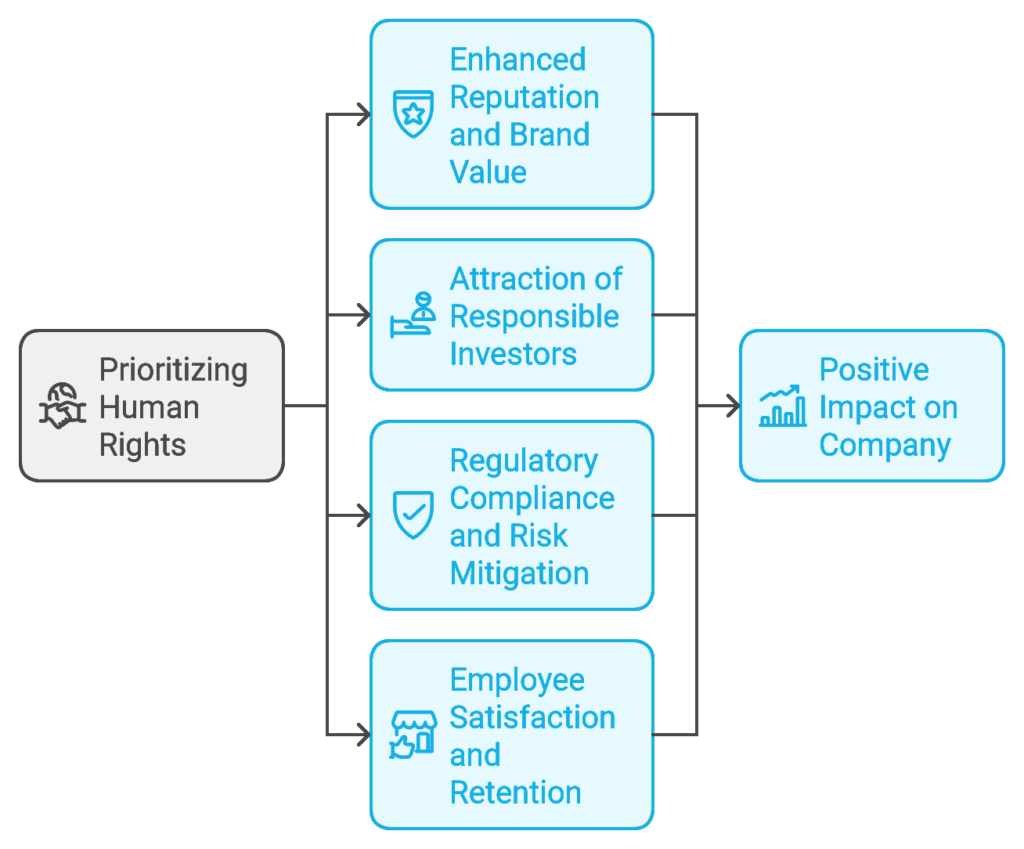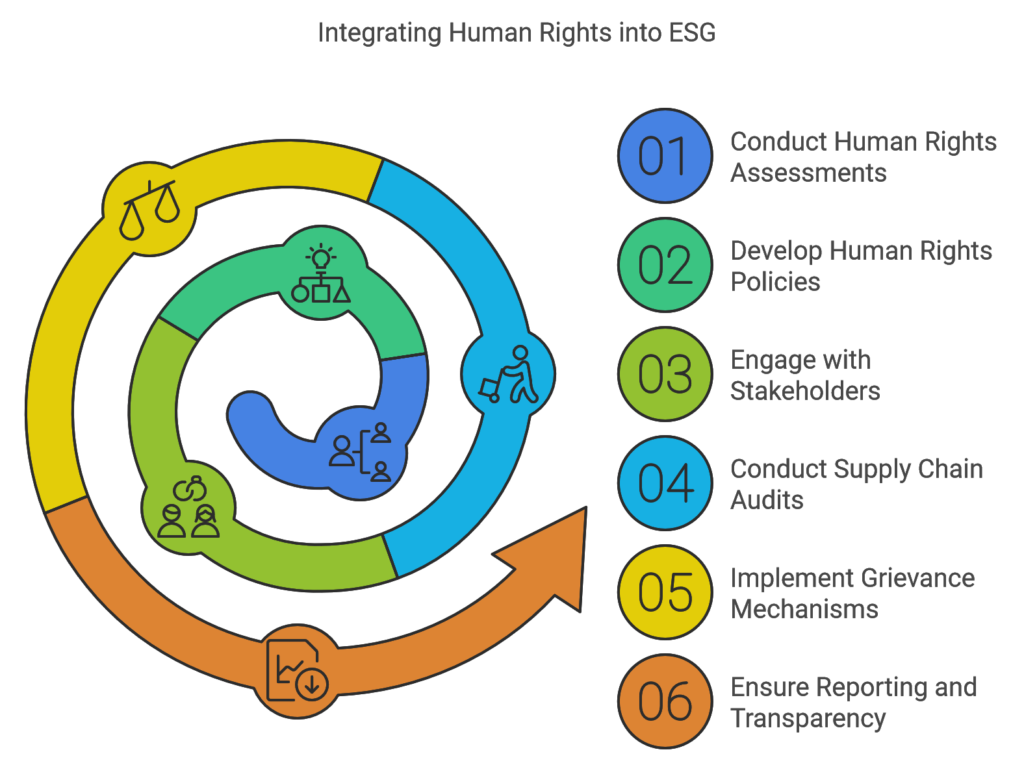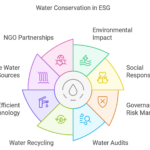As investors, consumers, and regulators increasingly prioritize Environmental, Social, and Governance (ESG) criteria, corporate responsibility for human rights is gaining more attention. Human rights, an essential part of the “Social” component in ESG, reflects a company’s commitment to respecting and upholding the dignity, equality, and rights of all individuals involved in and impacted by its operations.
This blog post explores the role of human rights in ESG, why it matters for businesses, and how organizations can integrate human rights into their corporate strategies for a more sustainable, ethical future.
Why Human Rights Matter in ESG
Human rights in ESG go beyond compliance. They encompass fair wages, safe working conditions, non-discrimination, and respect for individuals’ freedom and well-being. For companies, respecting human rights isn’t only a moral responsibility—it’s also increasingly a business necessity.
Here’s why human rights have become central to ESG:
- Enhanced Reputation and Brand Value
Companies that prioritize human rights build trust and foster goodwill among consumers, investors, and the communities they serve. Consumers are more likely to support brands that align with their values, and a strong human rights record can elevate a company’s reputation. - Investment Attraction
Investors now assess companies’ social impact before making investment decisions. Organizations that protect human rights and promote equality attract more responsible investors who prioritize long-term sustainability and ethical business practices. - Regulatory Compliance and Risk Mitigation
As governments impose stricter regulations on labor practices, health and safety, and anti-discrimination policies, companies must remain vigilant in protecting human rights. Prioritizing human rights in ESG reduces the risk of legal repercussions, operational disruptions, and financial penalties. - Employee Satisfaction and Retention
Employees want to work for companies that treat them fairly and respect their rights. Fostering a supportive and inclusive workplace leads to higher employee satisfaction, engagement, and retention.

Key Human Rights Issues in Corporate ESG Strategies
Incorporating human rights into corporate ESG strategies requires a comprehensive approach. Here are some of the core human rights issues companies should address:
1. Labor Rights and Fair Wages
Providing fair wages, reasonable working hours, and benefits are foundational to respecting human rights in the workplace. Companies that ensure fair wages and adhere to labor rights not only support workers’ well-being but also contribute to economic equality.
2. Safe and Healthy Working Conditions
A safe workplace is a fundamental right. Companies should enforce safety protocols, provide necessary training, and ensure that their facilities meet health and safety standards. For industries like manufacturing, mining, or agriculture, where risks are higher, ensuring safe working conditions is even more crucial.
3. Non-Discrimination and Inclusion
Respecting diversity and promoting inclusivity are essential to human rights. Companies should develop anti-discrimination policies, foster inclusive hiring practices, and create environments that respect cultural, ethnic, and gender diversity. This approach improves morale and allows for a more productive and innovative workforce.
4. Prevention of Forced Labor and Child Labor
Forced labor and child labor are critical human rights abuses that continue to affect supply chains worldwide. By thoroughly vetting their supply chains, companies can ensure that all workers are free from exploitation. Implementing due diligence measures and monitoring suppliers is essential to prevent forced or child labor.
5. Data Privacy and Protection
In the digital age, data privacy has become an essential human right. Companies that handle customer and employee data must implement measures to protect this information. Failing to protect personal data can result in breaches of trust, as well as legal and financial repercussions.
6. Community Impact and Indigenous Rights
Companies operating in or near indigenous lands should respect local communities and work to minimize negative environmental and social impacts. This includes fair consultation with affected communities, respecting cultural heritage, and providing benefits that contribute to local development.
How Companies Can Incorporate Human Rights into Their ESG Strategy
To integrate human rights effectively into ESG, companies need a structured approach that involves assessment, policy-making, monitoring, and transparency.

1. Conducting Human Rights Assessments
The first step is to assess the company’s current impact on human rights. This assessment identifies risks, such as exploitative labor practices or inadequate health and safety measures. Engaging with human rights experts, NGOs, and affected stakeholders helps companies gain insights into their human rights footprint.
2. Developing Human Rights Policies
Creating a comprehensive human rights policy sets the tone for corporate responsibility. This policy should outline the company’s commitment to upholding human rights, provide guidelines for ethical behavior, and highlight specific areas, such as anti-discrimination, fair wages, and safety standards.
3. Engaging with Stakeholders
Engaging with stakeholders—including employees, customers, suppliers, and local communities—ensures that human rights policies address real concerns. Ongoing dialogue helps companies understand stakeholder expectations, address grievances, and build stronger relationships based on transparency and trust.
4. Conducting Supply Chain Audits
Companies should regularly audit their supply chains to ensure that all suppliers comply with human rights standards. These audits help identify risks of child labor, forced labor, or unsafe working conditions. Partnering with suppliers to address any human rights abuses identified during these audits is crucial for long-term change.
5. Implementing Grievance Mechanisms
Companies should establish accessible grievance mechanisms, allowing employees and stakeholders to report violations without fear of retaliation. Anonymity and confidentiality should be prioritized to encourage reporting and ensure that complaints are addressed appropriately.
6. Reporting and Transparency
Regular reporting on human rights impact is essential for transparency. Companies can publish annual ESG or sustainability reports that include metrics on labor practices, health and safety, and diversity. Transparent reporting demonstrates accountability and commitment to human rights goals.
The Role of Investors in Supporting Human Rights in ESG
Investors play a key role in promoting human rights in ESG by supporting companies that uphold ethical standards and avoiding those that do not. Socially responsible investors assess companies’ social impact, looking at labor practices, diversity, and community engagement. By prioritizing investments in companies that champion human rights, investors can drive change on a larger scale, encouraging companies to adopt sustainable and ethical practices.
Examples of Companies Leading in Human Rights within ESG
Several global companies have integrated human rights into their ESG initiatives, setting benchmarks for others to follow:
- Unilever: Unilever has set ambitious targets for labor rights, safe working conditions, and community impact. The company’s Human Rights Report outlines its efforts to ensure fair treatment of workers throughout its supply chain, focusing on health and safety, fair wages, and equal treatment.
- Patagonia: Known for its commitment to environmental and social causes, Patagonia is a leader in upholding labor rights and sourcing ethical materials. The company conducts regular audits of its supply chain to ensure safe and fair labor practices, and it actively engages in initiatives that support local communities.
- Microsoft: Microsoft has made human rights a priority, especially regarding data privacy and protection. The company has established stringent data privacy policies to protect user information and has taken significant steps to promote diversity and inclusion within its workforce.
Challenges and Future Outlook for Human Rights in ESG
While human rights are gaining prominence in ESG, there are challenges that companies face:
- Global Supply Chain Complexity
Many large corporations have vast, global supply chains, making it challenging to monitor compliance across all regions. Human rights standards vary worldwide, and companies must invest in robust monitoring to ensure consistency. - Balancing Profitability with Ethical Responsibility
Some companies may face resistance when prioritizing human rights due to perceived cost implications. Balancing profitability with ethical responsibilities requires a shift in perspective, emphasizing long-term value creation over short-term gains. - Regulatory and Cultural Differences
Regulatory standards for human rights vary by country, creating challenges for companies that operate internationally. Understanding and adapting to these differences while upholding a uniform human rights policy is critical.
Conclusion: Making Human Rights Central to Corporate Responsibility
As ESG continues to shape the future of corporate responsibility, human rights will remain a cornerstone of sustainable and ethical business practices. For companies, prioritizing human rights isn’t just the right thing to do—it’s also a strategic move that builds trust, enhances brand reputation, and attracts responsible investment. By fostering fair labor practices, ensuring safe working conditions, respecting diversity, and addressing human rights risks in the supply chain, companies can play a meaningful role in advancing human rights on a global scale.
Ultimately, when companies commit to upholding human rights, they contribute to a more equitable, inclusive, and sustainable world, setting a positive example that resonates with employees, consumers, and investors alike. Through transparency, accountability, and active engagement, businesses can build a future where human rights are not only respected but celebrated as a core element of corporate success.

